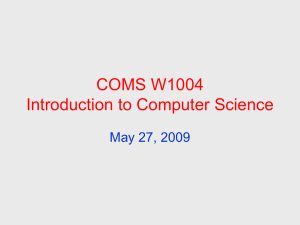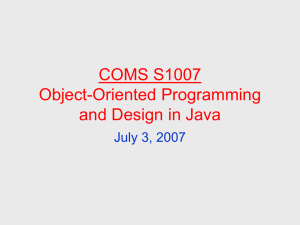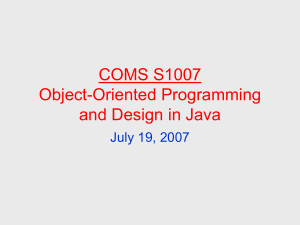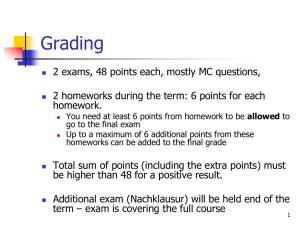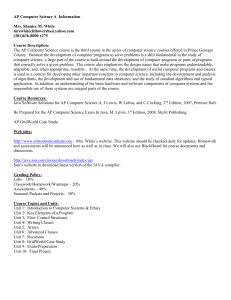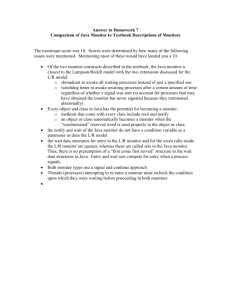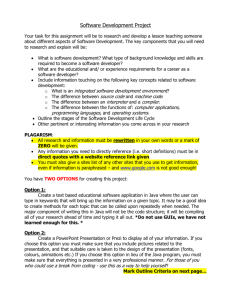slides
advertisement
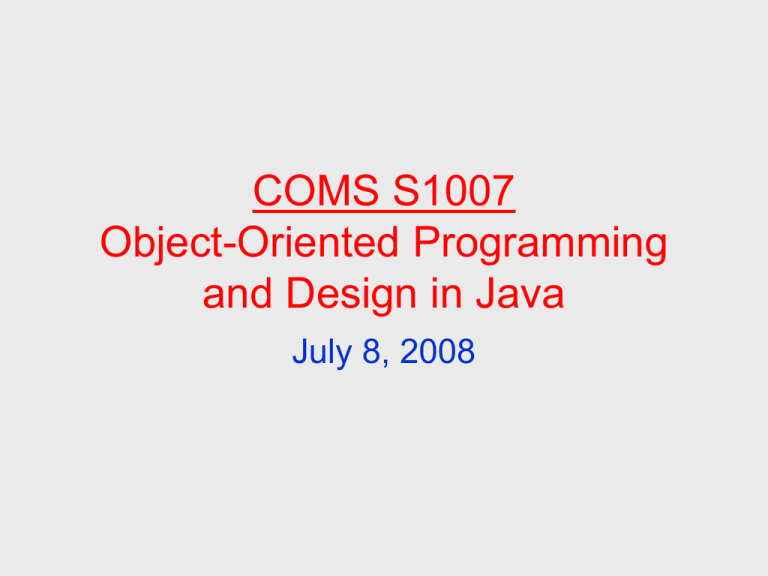
COMS S1007 Object-Oriented Programming and Design in Java July 8, 2008 Teaching staff • Chris Murphy – cmurphy@cs.columbia.edu – Office hours: Tues 3-5pm or by appointment, 608 CEPSR • Swapneel Sheth – swapneel@cs.columbia.edu – Office hours: Thurs 3-5pm, 608 CEPSR • Starting next week About the course • The second course for majors in computer science. A rigorous treatment of objectoriented concepts using Java as an example language. • Development of sound programming and design skills, problem solving and modeling of real world problems from science, engineering, and economics using the object-oriented paradigm. Prerequisites • COMS W1004 or AP Computer Science with a grade of 4 or 5 • Completion of an Intro to Java course at another university • You should be familiar with basic Java concepts and programming principles • You should be comfortable writing a 200line program with 4-5 classes Course homepage http://www.cs.columbia.edu/~cmurphy/1007 • Please check the course homepage frequently for important announcements and changes to the reading assignments CourseWorks http://courseworks.columbia.edu/ • Check the “Discussion” section for questions related to the homeworks • Check the “Gradebook” to make sure our records match your own Grading • Homeworks: 35% • Final project: 25% • Final exam: 40% • These are “guidelines” for the final grade Homeworks • There will be three homework assignments this semester – You generally have one week to complete them • Homeworks will be posted on the course homepage • Late submissions are not allowed! Final Project • The final project can be thought of as a “big” homework assignment • As part of Homework #3, you will write a proposal that describes the functionality and the design of your application • At the end of the course, you will demo your project to the class Final Exam • An in-class final exam will be held on the last day of class: Wednesday, August 14 • Exam covers material from readings and lectures (so come to class!) • There are no make-up exams! Textbook • Cay Horstmann Big Java, Third Edition • Available at CU Bookstore or Amazon • Chapter numbers are different from the Second Edition Syllabus • Topics covered include: – Advanced Java features – Principles of object-oriented design – Good programming practices – Basic graphics – Data structures • Check the course homepage for assigned readings for each lecture Academic honesty • Please familiarize yourself with the Computer Science Department’s policy: http://www.cs.columbia.edu/education/honesty • It is YOUR responsibility to read and adhere to the policy Today • Review of Java basics – Third edition: Chapters 1-7 except “T” (Testing) and “G” (Graphics) sections Development Environments • Eclipse – http://www.eclipse.org • NetBeans – http://www.netbeans.org • JGrasp – http://www.jgrasp.org Chapters 2-3: Using Objects & Implementing Classes • Objects and classes • Methods • Constructors • Accessors & mutators • Object references • The Java API: String, Scanner Chapter 4: Data Types • The 8 primitive Java data types • Constants • Assignment, Increment, Decrement • Math functions Chapters 5-6: Decisions and Iteration • The “if” statement • Boolean expressions • “while”, “do/while”, and “for” loops • Generating random numbers Chapter 7: Arrays & ArrayLists • Arrays – Everything must be same type – Fixed size • ArrayLists – Address above limitations of Arrays – Important methods: add, get, contains, remove
